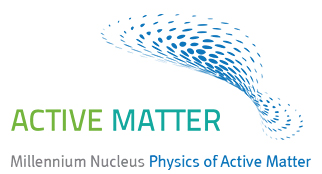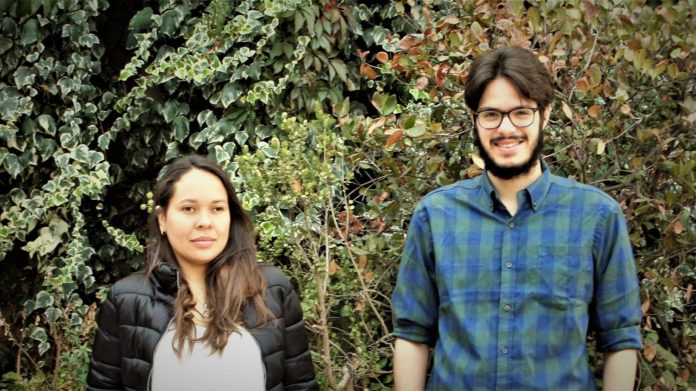The Millennium Nucleus Physics of Active Matter welcomes new post-doctoral researchers. They are Pablo de Castro, Doctor in Physics from the King’s College, London, Great Britain and Andrea Villa, Ph.D. in Physics from the Venezuelan Scientific Investigations Institute (IVIC), Venezuela.
Both researchers, from Brazil and Venezuela, were outstanding students in their doctorates and they already have publications. Rodrigo Soto; Director of the Millennium Nucleus, said they will be a very important contribution for the Nucleus because they will add new knowledge and experiences that will allow the center to give a new better perspective to the work is been developed in the Nucleus. Besides, the fact they are foreigners gives the Nucleus the capacity to attract international researchers.
Pablo de Castro
Pablo de Castro, Brazilian Physicist was finishing his doctorate in King’s College in London, Great Britain when he founded out that the Millennium Nucleus Physics of Active Matter was opening its selection process for post-doctoral researchers. “The call got to me through an e-mail sent to scientists that worked with soft materials and I felt immediately interested. Professor Rodrigo Soto and his team are internationally recognized by their enlightening and impressive articles. Besides, Santiago is a lovely city that I have previously visited. I realized it was a great opportunity in which I could apply all the knowledge I obtained in the doctorate”, he said.
His doctoral thesis “Phase separation of polydisperse fluids” was qualified with the highest distinction and recommended for the best thesis award. The study is about a subject he pretends to extend in the Millennium Nucleus. “This must include verifications performed with experiments with micro-swimmers (bacteria) that will be carried out in the impressive installations available here. One of the points we are going to investigate is the drop formation dynamics, created when bacteria get accumulated in a determined region”, explains the Researcher and Assistant Professor in King’s College, London between 2016-2019. He already has three publications in scientific magazines, and he has participated in more than fifteen international conferences in South America and Europe.
Andrea Villa
It was in the Millennium Nucleus page that Andrea Villa found out about the Active Breakfasts, talks about physics of the active matter that every week is performed in the Nucleus on his Beauchef headquarter in Santiago, Chile. “I started to participate in them and in the international talks too”, said Villa.
At that moment she was finishing her doctorate thesis about the dynamics of the passive- deformable Brownian particles. She studied at the École de Physic des Houches, France in its Active Matter College (September 2018). “I noticed Rodrigo Soto and his team were recognized by the rest of the researchers that work in that area because of their great job. I found out about the post-doctoral position through the web page and I applied”, Says the Venezuelan physicist.
She obtained the vacancy, and in January 2019 she also participated in the summer internships of the University of Chile, under the care of Rodrigo Soto, Director of the Millennium Nucleus.
“I hope to collaborate with the rest of the team and contribute with the theoretical knowledge about the passive colloids area I have. The idea is to extend that to the active matter. During my doctorate, I had the opportunity to work with computational models on the microfluidic area and I know it is possible to extend that study with experiments with proteins in collaboration with María Luisa Cordero”, says Villa, who has participated in nine international conferences in South America and Europe.
She has two publications in scientific magazines, and she is working on three more.
Andrea is an expert in Brownian systems and microfluidics so she can contribute to micro-swimmers modeling. Pablo is an expert in colloid phases separation, and he is going to apply this knowledge in the study of the active matter. None of them have ever worked with the active matter on their doctorates, that reason allows them to bring fresh ideas without precedents to the team. The important thing is that they are experts in statistics and fluids which allows them to contribute with good ideas”, says Rodrigo Soto, Director of the Millennium Nucleus.
New thesis students
Besides the two previous incorporated researchers, we must add another four new students.
Cristian Villalobos
He is a Bachelor and Master’s in Physics from the Pontifical Catholic University of Valparaiso (PUCV). He got to the Nucleus to perform his doctorate in physics to study the magnetic bacteria carpets.
During his thesis named “Fluctuations produced by a carpet of magnetic bacteria,” he sought to perform a theoretical work under the supervision of Professors Rodrigo Soto and María Luisa Cordero. “We will do an experimental microfluidic mount to study the interaction produced by a carpet of magnetic bacteria and one particle that will be trapped in an optical tweezer”, says Villalobos, Assistant Professor in the Physics Department of the PUCV, from 2013-2018. He has participated in congresses and workshops on his area.
Fernanda Pérez
She started in the Millennium Nucleus as a Magister Assistant. Then, she studied two years in the Master’s Program of the Nucleus and this year she decided to be transferred to the Doctoral Program where she is performing her thesis under Rodrigo Soto’s supervision.
Her investigation consists of mold theoretically not polarized active biological epithelial tissues with the aim of study its statistical properties. Part of her job is been made with fishes’ embryos, in collaboration with Miguel Concha from the Medicine Faculty of the University of Chile and Associated Researcher of the Millennium Nucleus. “One of my goals is to create an effective theory about biological membranes”, says Fernanda Pérez, who is an Assistant Professor in the Physics Department of the University of Chile since 2007 and has participated in ten congresses and international courses. In 2018 she was elected by the Chilean Society of Physics as the author with the best poster in the XX Chilean Physics Symposium.
Benjamín Oliva
Bachelor in Physics of the Physics and Mathematics Science Faculty of the University of Chile and a current student of the Master’s Program of our Millennium Nucleus.
Under the supervision of María Luisa Cordero, Oliva is investigating water drop dynamics in super-hydrophobic microchannels. “A super-hydrophobic microchannel could suppose the ideal vehicle to work with micro drops without the necessity of contaminating the samples with surfactants, something that is very important when the main applications of the microchannels are in the biology and chemistry”, says Oliva, who has been Mentor and Assistant Professor in the Physics Department of the University of Chile since 2016.
Leonardo Leiva
Bachelor in Physics of the Physics and Mathematics Science Faculty of the University of Chile. He is been for two years in the Millennium Nucleus Master’s Program and is working on his thesis under the supervision of Rodrigo Soto.
He is investigating “Active Particle Nucleation” intending to find a general law that characterizes its growth to predict behaviors in complex systems using the model that it is been simulated. “In certain conditions the active self-propelled particles group and get accumulated in clusters. Through computational simulations we will find the conditions in which the clusters are formed and after that their growth will be studied”, he explains.
Leonardo Leiva has collaborated with diverse Professors from the Physics and Mathematics Sciences Faculty of the University of Chile in many investigations. He has worked with Nicolás Mujica, Domenico Sapone y Luis Foa, and he has been Mentor in the Physics Department of the University of Chile.


